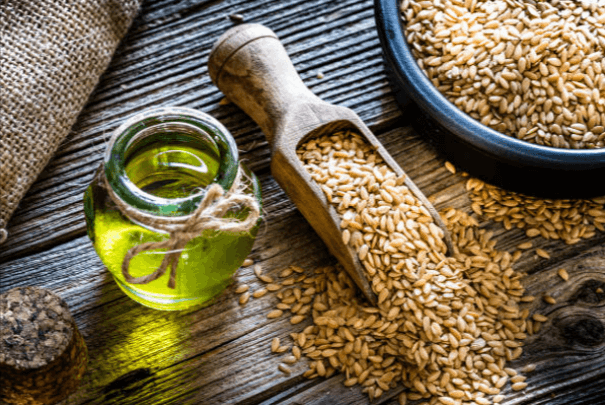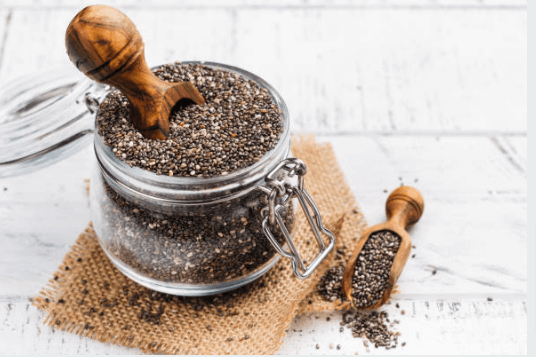The many reported health benefits of chia seeds and flax seeds have led to their increased consumption in recent years.
Chia seeds are the tiny, oval-shaped seeds of the Mexican and Central American plant Salvia hispanica. Their nutty flavor makes them a popular addition to smoothie bowls and yogurt. Chia seeds are an excellent source of fiber, protein, and omega-3 fatty acids, all of which contribute to general health and well-being.
The flax plant, from which flax seeds are harvested, prefers milder climates and is therefore primarily cultivated in countries like Canada, Russia, and the United States. Flax seeds, which have a mildly nutty flavor, are a versatile ingredient that may be baked into products or blended into drinks. Flax seeds, like chia seeds, are a good source of healthy carbs, protein, and fat.
In terms of nutrition, chia seeds and flax seeds are both formidable competitors. The question of whether is the most beneficial to health, however, remains open.
Here, the health advantages of chia seeds and flax seeds will be compared so that you can make an informed decision on which is better for you. To assist you choose the best seed for your diet, we’ll analyze its nutritional value, health benefits, and possible negative effects.
Nutritional Profile of Flax Seeds

Like their chia seed counterparts, flax seeds are a nutrient powerhouse that contains a wide range of beneficial substances.
The high fiber content of flax seeds is one of its most important nutritional benefits. Flax seeds are rich in both soluble and insoluble fiber, the latter of which helps with digestion and the former with weight management and blood sugar control.
Flax seeds provide all nine essential amino acids, making them a great plant-based protein source. Because of this, they can be used by vegetarians and vegans as their sole source of protein. Protein is important for many bodily functions, including the growth and repair of tissues as well as the maintenance of lean body mass.
Omega-3 fatty acids, in particular, can be found in high concentrations in flax seeds. The benefits of omega-3s on cognitive performance, cardiovascular wellness, and inflammatory management cannot be overstated. In fact, flax seeds have even more omega-3s than chia seeds, making them one of the greatest plant-based sources.
Flax seeds have been demonstrated to have anti-cancer qualities, and their presence of lignans, a form of phytoestrogen, is another unique nutritional benefit. Lignans help with heart health, lower breast cancer risk, and alleviate menopause symptoms.
Nutritional Profile of Chia Seeds

Because of their extraordinary nutritional profile, chia seeds are frequently referred to as a “superfood.” Small as they are, these seeds pack a nutritional punch thanks to their abundance of essential nutrients.
The high fiber content of chia seeds is one of their most important nutritional benefits. Because of their high fiber content, chia seeds are useful for controlling appetite, easing digestion, and maintaining healthy blood sugar levels.
Chia seeds contain all nine necessary amino acids, making them a fantastic plant-based protein source. Because of this, they can be used by vegetarians and vegans as their sole source of protein. Protein is important for many bodily functions, including the growth and repair of tissues as well as the maintenance of lean body mass.
Chia seeds are a great source of healthful lipids, especially omega-3 fatty acids, in addition to fiber and protein. The benefits of omega-3s on cognitive performance, cardiovascular wellness, and inflammatory management cannot be overstated. The omega-3 content of chia seeds is higher than that of flax seeds and even some fish, making them one of the greatest plant-based sources of omega-3s.
Antioxidants, found in abundance in chia seeds, shield cells from damage caused by free radicals and lower the probability of developing chronic diseases. Many plant-based foods contain antioxidants, which are essential for good health.
Comparison of Chia Seeds and Flax Seeds
When it comes to health advantages, flavor, and adaptability in the kitchen, chia seeds and flax seeds are both excellent options.
Nutritional Benefits:
Omega-3 fatty acids, protein, and dietary fiber can all be found in abundance in both chia and flax seeds. The omega-3 content of flax seeds is higher than that of chia seeds. Flax seeds, like chia seeds, contain a high concentration of lignans. However, chia seeds surpass flax seeds as a source of minerals calcium, magnesium, and phosphorus.
Pros and Cons
Chia seeds have a higher digestion rating than flax seeds. This is due to the fact that the flax seed’s hard outer shell must be ground in order to release its nutrients, whereas the chia seed’s soft outer shell can be consumed whole. However, pulverized flax seeds can be used in place of eggs or in baking, expanding the number of recipes in which they can be employed.
The flavor of both seeds is light and nutty. Chia seeds have a somewhat crunchier texture than flax seeds, whereas some people find flax seeds to have a slightly bitter flavor, especially if they are not ground.
Both seeds are highly adaptable in the kitchen and can be utilized for a wide range of recipes. Chia seeds’ unique propensity to swell when combined with water makes them an excellent thickener.
Smoothies, puddings, and baked goods that call for eggs typically feature these fruits. Although flax seeds have several culinary applications, they are most often used as a garnish for savory dishes like oatmeal, yogurt, and salads.
Which Seed is Healthier?
Since both chia seeds and flax seeds have their own set of health benefits, it’s tough to say which one is better.
Chia seeds are a great option for vegans and vegetarians looking for a complete protein source. They are also rich in calcium, magnesium, and phosphorus. They are rich in healthful lipids, especially omega-3 fatty acids, and contain a lot of beneficial fiber. Furthermore, chia seeds are rich in antioxidants, which can shield cells from damage caused by free radicals.
If you’re wanting to improve your consumption of healthy fats, flax seeds are a better option than chia seeds because they contain more omega-3 fatty acids. They have been demonstrated to have anti-cancer qualities and are rich in fiber, protein, and lignans.
Which seed is better for you depends on your own dietary preferences and requirements. Incorporating either chia seeds or flax seeds into your diet is a terrific choice.
While chia and flax seeds have been shown to have many positive health effects, they are not necessarily appropriate for everyone. These seeds may be too high in fiber for people on low-fiber diets or with a history of digestive difficulties, so they should be consumed with caution by those groups of people.
Flax seed has chemicals that can interfere with thyroid function, thus it’s best avoided in big quantities by people with medical disorders like thyroid disease.
Frequently Ask Questions
Sources We Used to Write This Article
- Abdelhamid, A. S., et al. (2018). Omega‐3 fatty acids for the primary and secondary prevention of cardiovascular disease.
https://www.ncbi.nlm.nih.gov/pmc/articles/PMC6513557/ - Calado, A et al. (2018). The effect of flaxseed in breast cancer: A literature review.
https://www.ncbi.nlm.nih.gov/pmc/articles/PMC5808339/ - Chia seeds. (n.d.).
https://fdc.nal.usda.gov/fdc-app.html#/food-details/1100612/nutrients - Chia seeds. (n.d.).
https://www.hsph.harvard.edu/nutritionsource/food-features/chia-seeds/ - Flax. (2021).
https://www.thecanadianencyclopedia.ca/en/article/flax - LDL and HDL cholesterol: “Bad” and “good” cholesterol. (2020).
https://www.cdc.gov/cholesterol/ldl_hdl.htm - Parikh, M. et al. (2019). Dietary flaxseed as a strategy for improving human health.
https://www.ncbi.nlm.nih.gov/pmc/articles/PMC6567199/ - Petruzzello, M. (2021). Chia.
https://www.britannica.com/plant/chia - Seeds, flaxseed. (n.d.)
https://fdc.nal.usda.gov/fdc-app.html#/food-details/169414/nutrients - Skulas-Ray, A. C., et al. (2019). Omega-3 fatty acids for the management of hypertriglyceridemia: A science advisory from the American Heart Association.
https://www.ahajournals.org/doi/full/10.1161/CIR.0000000000000709 - Soltanian, N. et al. (2019). Effect of flaxseed or psyllium vs. placebo on management of constipation, weight, glycemia, and lipids: A randomized trial in constipated patients with type 2 diabetes.
https://pubmed.ncbi.nlm.nih.gov/30661699/



